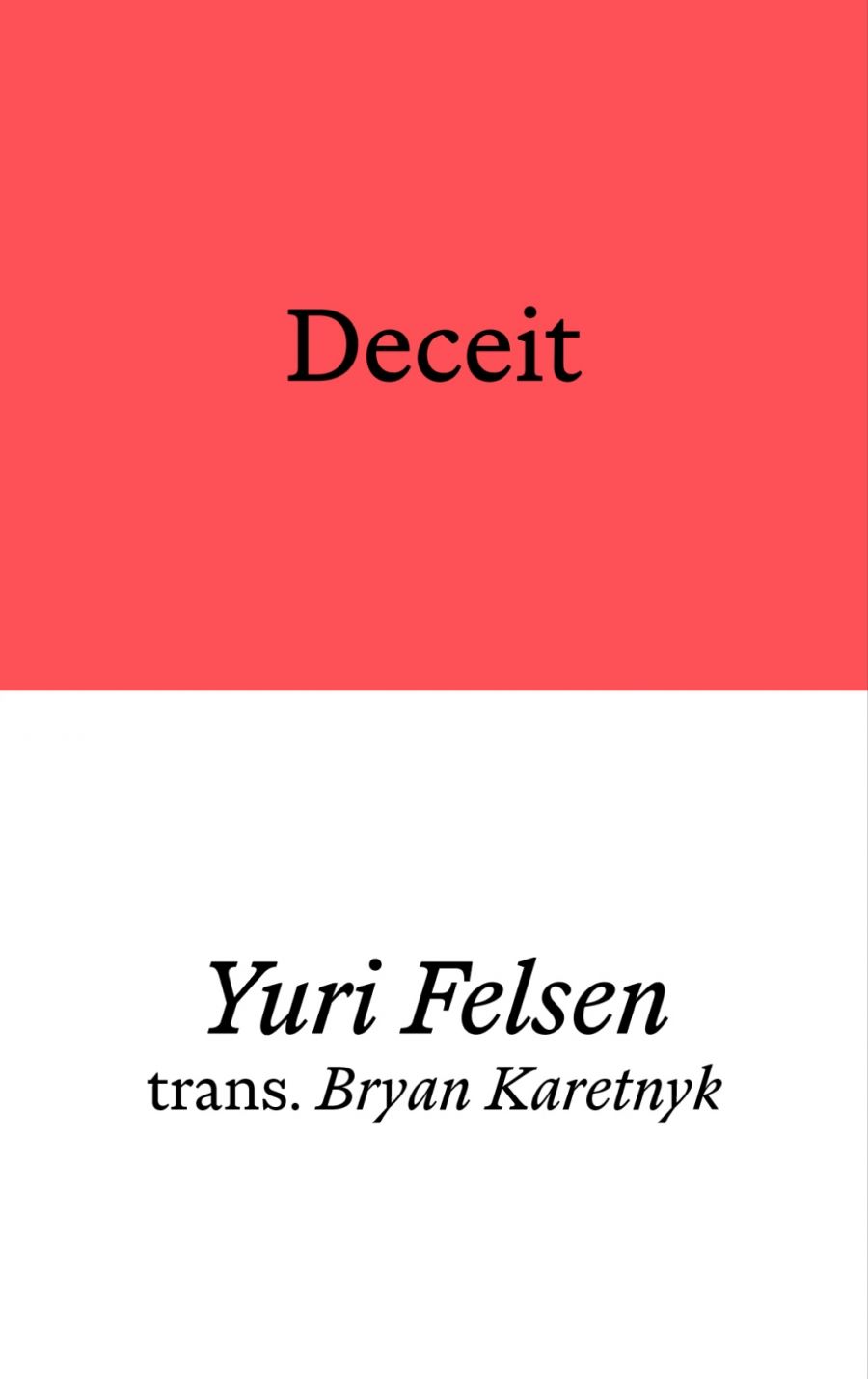
- Free Article: No
- Contents Category: Fiction
- Review Article: Yes
- Article Title: The Vivisector
- Article Subtitle: A new translation of a modernist work
- Online Only: No
- Custom Highlight Text:
Nikolai Freudenstein was born in St Petersburg in 1894 and wrote his first novel, Deceit (обман), under the pseudonym Yuri Felsen. In 1923, he fled the Bolshevik Revolution, first to Riga then to Berlin, eventually settling in Paris, where the novel takes place. At the height of his career in 1943, he was caught in German-occupied France, deported to Auschwitz, and murdered there in a gas chamber. Bryan Karetnyk, in translating Deceit into English from the Russian, has sought to bring the modernist work out of obscurity.
- Featured Image (400px * 250px):

- Alt Tag (Featured Image): Kate Crowcroft reviews 'Deceit' by Yuri Felsen, translated by Bryan Karetnyk
- Book 1 Title: Deceit
- Book 1 Biblio: Prototype, £12 pb, 254 pp
- Book 1 Readings Link: booktopia.kh4ffx.net/1534rD
Among a set of Russian émigrés, the unnamed narrator lives a life of money trouble, sensual dalliance, and self-described ‘insulting uncertainty’. A trusted acquaintance from Berlin, Yekaterina Viktorovna, tells him of her niece Yelena Vladimirovna (Lyolya), a uniquely charming young woman in the process of escaping an unhappy marriage. Lyolya will soon be in Paris, and the narrator is enlisted by her aunt to be the girl’s friend and helper. Her arrival in place, the narrator fixates on Lyolya as the one woman he believes able to deliver him from the numerous and longstanding torments of his psyche. So begin his tightly wound psychological projections that emerge from his obsession with the love object. The book charts the relationship that plays out between them, told in the forms of a diary and unsent letters, with much of the actual content of the relationship derived from his imagination.
The narrator vivisects each encounter, each movement, each perceived rejection by the beloved in the most striking pathological detail. Nothing lives up to his visions and the obsession reaches an inevitable climax distinctive of Russian modernist works. In telling the book through the form of a diary – papers the narrator thinks of destroying, and quietly hopes never fall into the hands of a reader – Felsen offers a study in self-deception so scrupulous that the reader encounters the step-by-step construction of a created reality. The narrator’s fluctuations in mood and his rationalisations of his internal contradictions are so logical that they expand the possibilities of truth itself. As the narrator agitates for Lyolya’s attentions, her perceived rejections ignite his affections further. He enumerates her strengths, before being triggered to bring forward a recurring list of her innumerable faults. These episodes, spanning several pages, are finely rendered. His torments, fuelled by her reticence, confirm to him her irreplaceability and her superiority in comparison to other adoring lovers he takes in her stead and discards. Never once giving in to his imaginings, Loyola resists his fantasy of her and his scripting of their interactions, unsettling his mind to such a degree that the workings of his physical body begin to fail. Palpitations, nerves, and other symptoms erupt as the distance between his vision of their love and its physical inaction becomes apparent. The reader is witness to the mental roughage of love and its self-deceptions, translated in deft, engaging, and idiosyncratic prose.
In the book’s afterword, Karetnyk suggests that Felsen and fellow exiles were seeking to champion a form of anti-totalitarian writing that promoted freedom of artistic expression, and sought new ways for art to respond to growing tyranny in years marked by political polarisation, fascism, and militant communism. Deceit is in many ways a book about love set in opposition, as Felsen wrote, to ‘socialist barbarism’. Notwithstanding, Felsen writes an unnamed narrator so fuelled by an obsessive phantasmagoria as to render the beloved a spectre; his anxious machinations themselves take on a tyrannical atmosphere. If the book is an ars amatoria, the argument is non-linear, and the message purposefully ambivalent. The rendering of love shape-shifts in Deceit. Many episodes where Lyolya’s tenderness feels like an organic compound are eventually built up into a manufactured and overwrought product in the narrator’s mind.
The book reaches its climax in a country holiday planned by the narrator and gate-crashed by a rival, Bobby, one of their émigré social set in Paris. Bobby exemplifies a vacuous and dominant kind of leadership, his character ‘grinning, clumsy, all-powerful’. The narrator reasons that he has lost Lyolya entirely; the reader is witness to his internal exile: ‘We returned home along the autumn streets, which recalled the desolation of our Russian countryside; Lyolya and Bobby walked arm in arm, while I, resentfully, pressed on ahead.’ In the folds of his imagination, the beloved has played a symbolic host for what is lost and cannot be recovered. The trio return to her room, where, from his collapsed position in an armchair, he observes the impostor sit at her feet on a central bed. From there he watches them ‘resentfully, vigilantly, and with hostility’. The narrator’s helplessness is read in the context of intrusion, and the movement and flux of his affections read like continually evolving adaptations to trauma – ‘(after which I would be fine, I would change, forget, run away)’.
The book builds toward a final verbal confrontation as the power tussle between the narrator and Lyolya plays out. Lyolya demonstrates her full awareness of the narrator’s cerebral reverie and reproaches him for his ‘detective’s gaze’ upon her, giving the reader the impression that the two are extremely well matched, if destined never to be together. The narrator makes some final feverish arguments on the nature of love and deceit, and petitions for perhaps the only universal truth in the book, ‘the need for flexible, somewhat arbitrary, lenient laws for those in love – just as there are for children and for the insane’.



Comments powered by CComment